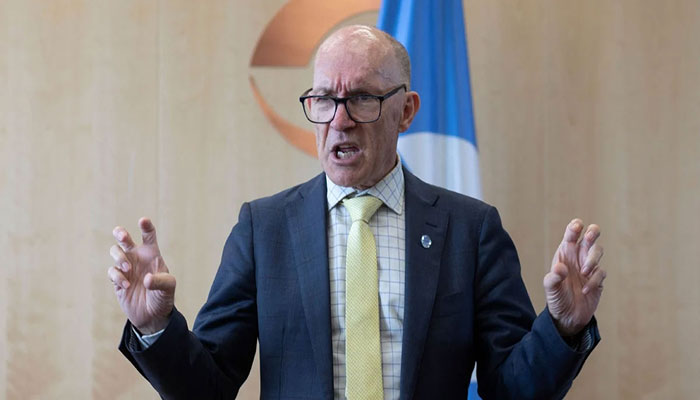World ‘better place’ 25 years after nuclear test-ban treaty
VIENNA: Twenty-five years after its adoption, the Comprehensive Nuclear-Test-Ban Treaty has made the world a safer place, experts say, despite never being ratified and concerns over North Korea. The Americans conducted the world’s first nuclear test in the desert of New Mexico on July 16, 1945.
Between then and September 24, 1996, when the treaty opened for signature, more than 2,000 nuclear tests were carried out, says Robert Floyd, head of the Comprehensive Nuclear-Test-Ban Treaty Organisation (CTBTO), a UN body.
Since September 24, 1996 there have been only a few dozen tests, carried out by India, North Korea and Pakistan. Nevertheless eight nuclear powers, including China, North Korea and the United States have refused to ratify the landmark treaty, preventing it from entering into force and despite increasing pressure, there is little sign that they will change their minds, analysts say.
"We’re in a much better place," insists Floyd, an 63-year-old Australian, during an interview with AFP in his bright office on the seventh floor of one of the UN towers in Vienna. The accord has set a "global norm against testing," he adds. "The only country to test this century is North Korea."
To ensure the absence of nuclear tests, the CTBTO, which operates with an annual budget of around 111 million euros ($130 million), has set up more than 300 monitoring stations around the world, which are capable of detecting the slightest explosion in real time. The treaty effectively stops nuclear proliferation "by making testing taboo," says Jean-Marie Collin of the French branch of the International Campaign to Abolish Nuclear Weapons (ICAN).
A total of 170 countries have now ratified the accord, including nuclear powers Britain, France and Russia, on the grounds that they have sufficiently advanced simulation programmes. Still missing are Egypt, India, Iran, Israel and Pakistan, as well as China, North Korea and the United States.
Floyd said he wanted to have "a conversation" with those states about "the pathway that we can have, to get from where we are now to a point where they would ratify and we could see, for all of humanity, a legally binding ban".
-
 Nicole Kidman Celebrates Galentine’s Day Months After Keith Urban Split
Nicole Kidman Celebrates Galentine’s Day Months After Keith Urban Split -
 Justin Bieber Unveils Hailey Bieber As First Face Of SKYLRK In Intimate Campaign Debut
Justin Bieber Unveils Hailey Bieber As First Face Of SKYLRK In Intimate Campaign Debut -
 Caitlin O’Connor Says Fiance Joe Manganiello Has Changed Valentine’s Day For Her
Caitlin O’Connor Says Fiance Joe Manganiello Has Changed Valentine’s Day For Her -
 Rachel Zoe Sends Out Message For Womne With Her Post-divorce Diamond Ring
Rachel Zoe Sends Out Message For Womne With Her Post-divorce Diamond Ring -
 James Van Der Beek's Final Conversation With Director Roger Avary Laid Bare: 'We Cried'
James Van Der Beek's Final Conversation With Director Roger Avary Laid Bare: 'We Cried' -
 Jaden Smith Walks Out Of Interview After Kanye West Question At Film Premiere
Jaden Smith Walks Out Of Interview After Kanye West Question At Film Premiere -
 Why Halle Berry Wasn't Ready For Marriage After Van Hunt Popped Question? Source
Why Halle Berry Wasn't Ready For Marriage After Van Hunt Popped Question? Source -
 Michelle Obama Gets Candid About Spontaneous Decision At Piercings Tattoo
Michelle Obama Gets Candid About Spontaneous Decision At Piercings Tattoo -
 Bunnie Xo Shares Raw Confession After Year-long IVF Struggle
Bunnie Xo Shares Raw Confession After Year-long IVF Struggle -
 Brooks Nader Reveals Why She Quit Fillers After Years
Brooks Nader Reveals Why She Quit Fillers After Years -
 Travis Kelce Plays Key Role In Taylor Swift's 'Opalite' Remix
Travis Kelce Plays Key Role In Taylor Swift's 'Opalite' Remix -
 How Jennifer Aniston's 57th Birthday Went With Boyfriend Jim Curtis
How Jennifer Aniston's 57th Birthday Went With Boyfriend Jim Curtis -
 JoJo Siwa Shares Inspiring Words With Young Changemakers
JoJo Siwa Shares Inspiring Words With Young Changemakers -
 James Van Der Beek Loved Ones Breaks Silence After Fundraiser Hits $2.2M
James Van Der Beek Loved Ones Breaks Silence After Fundraiser Hits $2.2M -
 Disney’s $336m 'Snow White' Remake Ends With $170m Box Office Loss: Report
Disney’s $336m 'Snow White' Remake Ends With $170m Box Office Loss: Report -
 Travis Kelce's Mom Donna Kelce Breaks Silence On His Retirement Plans
Travis Kelce's Mom Donna Kelce Breaks Silence On His Retirement Plans




